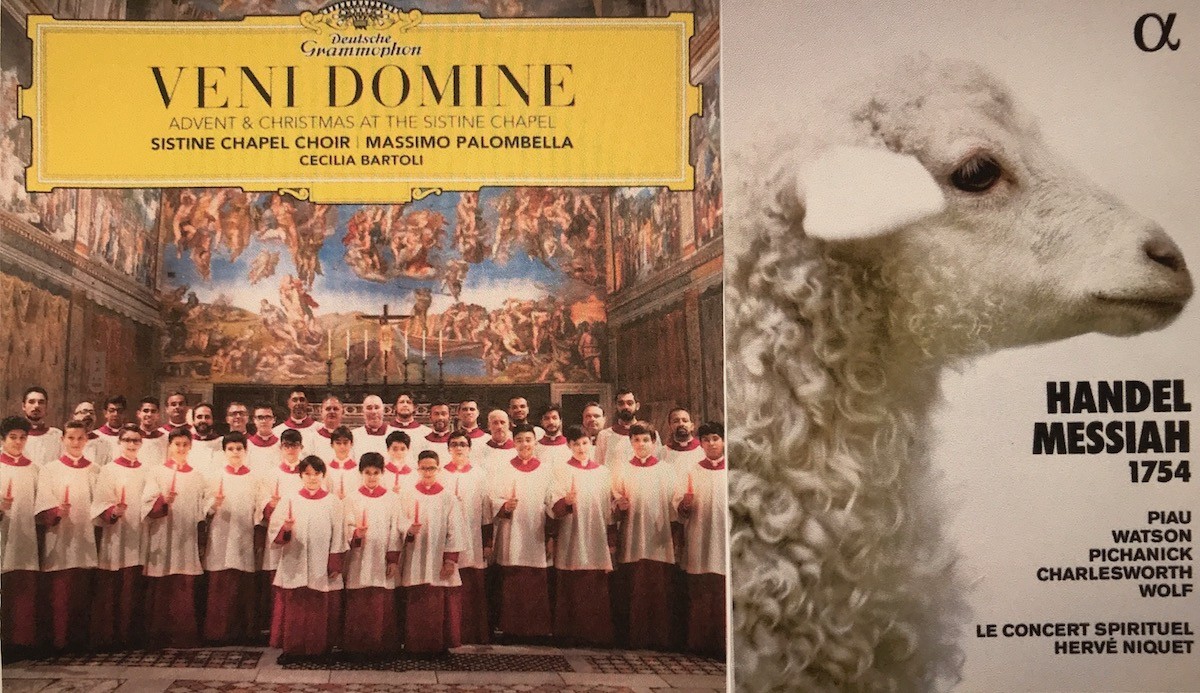If you are like me, the moment a salesperson says that something is their most popular item, I no longer want it. Few superior things come out of being part of the crowd. It’s also true when you are looking for something special for someone with discerning tastes who likes things that express themselves, not everybody else.
So here are a few stocking stuffer ideas from the world of art, classical music and jazz. New recordings that were released this year. Except for one every special recording.
Veni Domine is the first recording released by the Sistine Chapel Choir on which a woman is allowed to record with the choir. It’s directed by Massimo Palombella and performed in the magnificent Sistine Chapel, surrounded by the priceless frescos painted by Michelangelo di Lodovico Buonarrito over the four years 1508-1512. The frescos are considered the high point of the Italian High Renaissance.
The music includes Gregorian Chant and music from the 12th-16th centuries, sung in Latin. Much of it written by early Italian masters. Coloratura mezzo-soprano Cecilia Bartoli joins the choir for Perotin’s “Beata viscera mariae Virginis.” Not much is known about Perotin, except for the glorious music he left. He was believed to be French.
There are lots of recordings of Handel’s “Messiah,” but none like this 2017 recording by Herve Niquet directing Le Concert Spiriuel. This recording is the 1754 more-operatic version, which features five soloists, instead of the usual four. Since its formation in 1987 the ensemble has become one of the leading proponents of performance of Baroque choral music on period instruments.

Handel’s Ottone; Arias by Xavier Sabata; and Monteverdi’s Orfeo
If more 18th century music is appealing, this brilliant 2017 recording of Handel’s Ottone, the most popular of Handel’s operas performed during his lifetime. This recording features two wonderful countertenors, with very different voices. Croatian Max Emanuel Cencic sings the title role. The performance also features Spanish countertenor Xavier Sabata.
In Handel’s day, countertenor roles were sung by castroti, the most famous of whom was Senesino, for whom Handel wrote Ottone and several other operas. Today, countertenors are vocally trained to the upper registers, not by lopping off treasured body parts when they are young. Nothing sounds like the full, rich, round tone of a great countertenor. It’s nothing remotely like the pop music little-girl falsettos one hears on The Voice and elsewhere.
A second recording of countertenors is Monteverdi’s 1609 “Orfeo,” with French countertenor Philippe Jaroussky. “Orfeo” is the music telling of the classical story of the musician Orpheus using his skills to charm his way into the realm of the dead to retrieve his beloved Eurydice. Monteverdi’s music is the foundation on which later opera developed.
If you aren’t up to sitting through oratorios and operas, but love the countertenor voice, Xavier Sabata’s “Catharsis,” with its provocative cover photo that looks more like a romance novel than gorgeous arias from the 12th thru 18th centuries, accompanied by Armonia Athenea, conducted by George Petrou. This is the CD, if you only buy one. Truly remarkable. As are all of these actually.

Pianist Diana Krall’s Turn on the Quiet; Guitarist Matthew Stevens’ Preverbal; and Bill Frisell/Thomas Morgan’s Small Town
For jazz tastes, Canadian jazz pianist Diana Krall’s “Turn Up The Quiet,” Guitarist Matthew Stevens’ “Preverbal” and Bill Frisell’s new recording, with Thomas Morgan, “Small Town,” are can’t misses. At moments of Stevens’ “Preverbal” his electric guitar is as bare naked as the instrument can get and the Frisell/Morgan collaboration is simplicity defined, without the clutter of extra instruments. Pure listening pleasure.
Not to be dismissed are two recordings of contemporary choral music by the exquisite Philadelphia-based chamber choir The Crossing, which regularly commissions new pieces by the masters of the form, mostly minimalist and most-minimalism.

The Crossing’s recordings of John Luther Adams’ Canticles of the Holy Wind; and Gavin Bryars’ The Fifth Century
John Luther Adams’ 2017 “Canticles of the Holy Wind,” gorgeously sung by The Crossing, continues Adams exploration of the environment and defining and interacting with nature. Adams’ Pulitzer prize-winning orchestral masterpiece “Become Ocean” was performed at the 2015 Big Ears Festival by the Knoxville Symphony Orchestra. It is constructed as a perfect palindrome.
The Crossing’s recording of Gavin Bryars’ “The Fifth Century” is not new. But what is new is that the recording is nominated for a 2018 Grammy. The Crossing gave it a breathtaking performance, with Bryars present, at last year’s Big Ears Festival.
All of these recordings are readily available at Amazon and several other on-line sources.
If you would like to slip concert tickets into a special stocking, Bill Frisell will be in Knoxville to perform with the Knoxville Jazz Orchestra at the Mill and Mine on Jan. 23.
For classical music devotees who would like a weekend away, the Camerata RCO, composed by musicians of the Royal Concertgebouw Orchestra in Amsterdam, the Netherlands, one of the great orchestras in the world, will be performing on the Asheville Chamber Music Series in Asheville, N.C., on Jan. 23. Tickets are available online.

